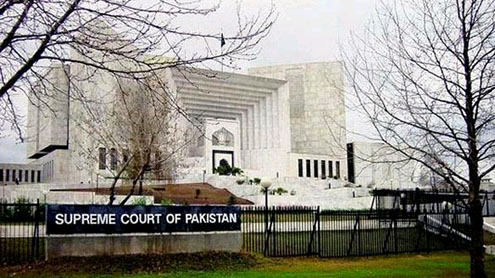 ISLAMABAD: The counsel for Prime Minister on Wednesday contended before the Supreme Court that punishment in criminal proceedings did not merely go on presumptions as the trial court had to ‘first establish harsh and cold evidences’.
ISLAMABAD: The counsel for Prime Minister on Wednesday contended before the Supreme Court that punishment in criminal proceedings did not merely go on presumptions as the trial court had to ‘first establish harsh and cold evidences’.
Barrister Aitzaz Ahsan appearing as counsel for PM in a contempt of court issue related to NRO implementation case, resumed his arguments before the seven- Judge bench headed by Justice Nasirul Mulk.Aitzaz said that the current proceedings was of criminal nature entailing serious consequences if established but from the orders of January 3, 10 and 16 passed by the benches over similar case, it was evident that no contumacy was attributed to his client with exception of ‘buck stops at his office’.
He said that his client was not aware of judicial proceedings after signing a summary on September 23, 2010 moved by ministry of law before him to which he accorded his approval, but directed that the issue be taken up before the Supreme Court.He said that after it his client thought that the implementation issue was stopped till January 16 when he was issued a show cause notice.The PM had already tasked the Attorney General and concerned law ministry to deal with legal issues and he was never conveyed such directives by the concerned, he added.
He also disputed that Attorney General had conveyed Court’s last orders to the PM personally.To bench’s query, he replied that Tv programme was not a part of judicial record.Justice Nasir ul Mulk referred to newspapers report over the issue but Aitzaz requested that the judges should not go beyond the judicial record. “If my guilt is established on this record, I may be punished,” he added.He said the order containing six options was a harsh one in which even the religious affinities of his client had been assailed.
“The mention of his oath has no relevancy, it is indeed a harsh order and it will be difficult for a you to do justice,” he added.Justice Athar Saeed remarked that they were sitting there with open minds.Aitzaz promptly replied that he hoped so but it was the job of lawyers to keep reminding judges, after all they too were human beings and could falter.Justice Asif Saeed Khan Khosa observed that they would not go beyond the law and assured that they would remain impartial.Objecting to bench’s proceedings, the counsel contended that in presence of Article 10A which ensured due process and fair trial, the same bench which had issued show cause notice could not act as prosecutors and judges.
Citing his reasons of objection, the counsel said that first, they issued show cause notice and secondly, they laid down January 3 order which was based upon harsh pre-trial opinion.Justice Asif Saeed Khan Khosa observed that his contentions would lead to a precedent in which every person facing trial could raise objection to proceedings on basis of Article 10A.He cited US judicial precedents and said that in the last 200 years in US judicial history, he had never come across such precedent in which a show cause notice had been issued in similar fashion.
Justice Khosa told him that he could not raise objection in collateral proceedings.Justice Khosa advised him to consider his objection as there would be no other forum for trial.Aitzaz said that he had also used words harsh and would continue his arguments in accordance with the law.The counsel said after revolutionary introduction of Article 10A, it had become ‘a case of first impression’ which radically changed scope of trial and there was no exception to contempt of court law.
To bench’s queries, he replied that if a process was violative of the due process, it had to be struck down and under this constitutional provision, he could not surrender his fundamental rights.The counsel further contended that in previous orders, attorney general, secretary law, prosecutor general NAB and chairman NAB were given directions for implementations and there was no direct order for the accused respondent.
He said there was no evidence that Attorney General had communicated the Court’s last directive to the Prime Minister personally.To bench’s query, the counsel said the president enjoyed complete and inviolable immunity under Article 248 (2) but at presently, he was not a party to the case. The President enjoyed immunity under the international law as well.The president was neither party nor a respondent in the case so Article 248 (2) would be irrelevant at the moment. “The Prime Minister’s state of mind is an issue and you have to take a decision over it,” he added.
He pleaded that the bench should divorce itself of media reports and go by the judicial orders.The counsel said that the case of his client had been frequently misreported as he had never said that Court’s orders were not implementable but said that it could not be implemented for the time being as the president was in his office.He apprised that cases were closed in Swiss courts on basis of merit and the request for mutual assistance had attained its finality.
To bench’s question, he said that the bench could have exercised the sixth option of its January 16 order to which Justice Nasir ul Mulk responded that they would consider it at an appropriate stage.Justice Asif Saeed Khan Khosa observed that justice might be blind but judges should not.The counsel complained that he had to face three-pronged trial simultaneously in public rallies, in Tv talk shows and at the judicial forums.There were all smiles when Justice Khosa remarked that with his appearance in Tv programmes, they were able to get prior knowledge about his arguments which was a good thing. – Brecorder












